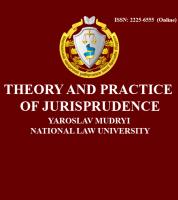Оновлена концепція контролю правильності визначення митної вартості товарів, які ввозяться (імпортуються) на митну територію України
Updated concept of validity check when determining the customs value of goods carried in (imported) in the customs territory of Ukraine
Author(s): Aleksy FedotovSubject(s): Law, Constitution, Jurisprudence, Law on Economics
Published by: Національний юридичний університет імені Ярослава Мудрого
Keywords: automated system for analysis and risk management; carriage in (import) in the customs territory of Ukraine; customs value; customs control; tentative indicators
Summary/Abstract: The article deals with a study of conceptual basics of validity check when determining the customs value of goods carried in (imported) in the customs territory of Ukraine. On the basis of the analysis of the effective legislation of Ukraine related to the state customs procedures the author revealed the issues of concern that arise when determining the «tentative indicators» of the customs value of goods that is used in the risk management system when clearing the goods carried in the customs territory of Ukraine under import customs regime (release in free circulation). The article gives the author’s definition of the «tentative indicators» notion of the customs value of goods – this is an average customs value of a unit of goods (according to the measurement units described in the Ukrainian classification of goods for external economic activity as well as to other units of measurement and records) that is computed automatically by ASARM for the last six months and is being formed by the moment of customs control and customs clearance based on the electronic customs declaration (at the stage when it is assigned an electronic number). Besides, the author does a legal comparison between the notions «tentative indicators of the customs value of goods» and «indicative prices» and proves that the statement that the «tentative indicators» notion of the customs value of the goods is close by content to the «indicative price of goods» is completely erroneous.It has also been established that by now it makes a problem for the territorial customs bodies of the State Fiscal Service (SFS) to verify correct determination, by the customs applicant or by a person authorized by such applicant, of the customs value of goods carried in (imported) in the customs territory of Ukraine or with respect of which the Price Database of the UAIS of the SFS contains no data about identical or similar goods. Therefore, it remains not clear which «tentative indicators» of the customs value of goods are to be taken into account by the customs applicant or a person authorized by him when carrying in (importing) goods in the customs territory of Ukraine.The author emphasized inexpediency of the computation by the SFS of the statistically average customs value of goods, that are carried in (imported) in the customs territory of Ukraine, which, though they are classified according to the sub-category of goods in compliance with the Ukrainian Classification of Commodities for Foreign Economic Activity, may still have different commercial descriptions and, accordingly, may have various functional uses. Apart of that, a question is raised how the SFS computes the statistically average customs value of goods that are highly liquid and have their trademark as compared with identical goods according to their functional use but have no trademark.It is stated that information about «tentative indicators» of the customs value of goods, that are carried in (imported) in the customs territory of Ukraine is not open and transparent as the customs applicants or persons authorized by them have no access to such information.The author comes to a conclusion that one of the mistakes of the SFS territorial customs bodies officers is that they demand all documents confirming the customs value of goods carried in (imported) in the customs territory of Ukraine that are indicated in Part 4 of Art. 53 of the Customs Code of Ukraine. Indeed, the necessity of submission of separate additional documents should be determined by an officer based on peculiarities of the external economic transaction.Taking into consideration the results of the made study the author comments that it is necessary to make a clear decision concerning the issues of defense of legal principles as regards the customs payment administration, exclusion of reduction of customs values and minimization of customs payments, ruination of possible schemes of import of goods in violation o the legislation of Ukraine related to customs affairs, etc. This is discouraged by a purely comparative nature of the «tentative indicators» and optionality of the application of recommendations of the Methodological recommendations with regard of control determination of the customs value approved by the SFS Order of 11.09.2015, No.689 by the SFS customs house officers.
Journal: Теорія і практика правознавства
- Issue Year: 1/2016
- Issue No: 09
- Page Range: 1-23
- Page Count: 23
- Language: Ukrainian

